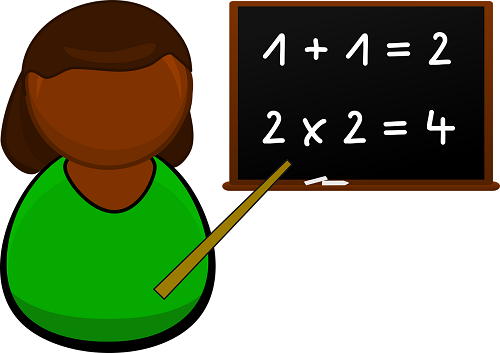As an aspiring math teacher, you might feel just as anxious as you are excited about being invited to interview for a job. Doing well on the interview could mean that you are finally starting the career you have been dreaming about for years, but that pressure can easily become overwhelming. Candidates for math teacher roles should be aware of licensing requirements, practice their answers to common interview questions be ready to teach a sample lesson.
IMAGE SOURCE: Pixabay, public domain
Make Sure You Meet Requirements for Your Teaching License
Teaching is one career in which a license or professional certification is required in all states, the United States Bureau of Labor Statistics (BLS) reported. If you don’t yet have your teaching license or you are certified in another state, it is important that you understand licensure requirements.
During a job interview for a math teacher role, you may be asked about any of the requirements for attaining a teaching license, including your college GPA, your student-teacher experience and your scores on general and subject-specific certification tests. If your bachelor’s degree was not in math education and you chose to go back to school to take an alternate route to teaching certification, you might face questions about your previous field of employment, your decision to change careers and where you are in the certification process. Some school districts will consider hiring teachers who are currently taking courses for alternate route certification and have them teach under the supervision of an established educator. A school district’s ability and willingness to do so depends on your program of study, state regulations and other factors.
While you don’t need a license to teach at a private school, opportunities in these settings pay thousands of dollars less per year and are scarcer. Around 85 percent of teachers are employed in public schools, the BLS reported.
Prepare for a Sample Lesson
As part of your degree in education or your alternate route teaching certification coursework, you had to take part in supervised student-teaching. As an interviewee for a math teacher role, you should expect to again show your teaching skills by delivering a sample lesson.
In a sample or demonstration lesson, the job applicant would teach materials he or she has prepared to a group of children under the observation of your prospective employer. The sample lesson does not require you to show off flashy or technological teaching methods, but rather to show how you manage a classroom, interact with the children and help students learn the material.
The prospect of teaching a sample lesson can seem intimidating, but keep in mind that you won’t be put on the spot. Typically, you will be assigned a topic and grade level in advance so that you can develop your lesson plan and practice carrying out the plan.
Don’t Forget to Practice for Your Interview Questions
Conducting a sample lesson is an interview task that you wouldn’t have to worry about in most other occupations. It makes sense that candidates who are up for math teacher jobs might focus so hard on planning for and practicing their sample lesson that they might neglect to prepare for other aspects of the job interview. However, applicants for math teacher roles usually must do well in a traditional interview before they are asked to give a sample lesson. Making the mistake of neglecting your interview preparation in favor of brainstorming about a yet-unassigned sample lesson could cost you the job you are trying so hard to get.
In most situations, an interview is not so much a test as it is a conversation with a purpose – to learn if you are a good fit for the position and the organization. Your interviewer will ask questions that serve to determine your competency for the role and how your personal and professional qualities would complement the culture of the school. It is always a good idea for aspiring math teachers to practice answering some common interview questions. If you are thinking about these basic questions for the first time during the interview, you might not have enough time to draw from your past coursework and experience and provide the best answers you possibly can. You might find yourself rambling on, going off-topic or forgetting important points that you wanted to make.
Interview questions about your educational and professional background, your goals, your reasons for choosing the career and your strengths and weaknesses are common. You should also take time to think of some questions that you can ask your interviewer. Candidates might want to know about the curriculum they would be teaching and the values and culture of the school where they would work.
Remember, the school district is looking for a candidate who is both effective at teaching and knowledgeable about mathematics. As you address each interview question, you want to show your prospective employer that you have both sets of skills.
Additional Resources
What Kind of Job Can You Get With a Degree in Math?
What Should You Know When You Interview for a Job With a Degree in Math?
What Is the Salary Potential for Someone With a Mathematics Education Degree?
How Long Does It Take to Get a Degree in Mathematics Education?

